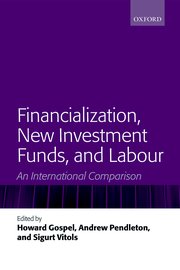
Article Artículo
Latin America and the Caribbean
FiveThirtyEight Gets it Wrong on VenezuelaMark Weisbrot / April 04, 2014
Article Artículo
Latin America and the Caribbean
USAID Subversion in Latin America Not Limited to CubaDan Beeton / April 04, 2014
Article Artículo
Lisa Caputo: Director Watch Director of the Day
Directorships: 1
Total director compensation, 2008-2012: $632,208
Average compensation for full year as director: $192,867
Dean Baker / April 04, 2014
Article Artículo
Economy Adds 192,000 Jobs in March, Unemployment Rate UnchangedApril 4, 2014 (Jobs Byte)
Dean Baker / April 04, 2014
Article Artículo
Economy Adds 192,000 Jobs in March, Unemployment Rate UnchangedApril 4, 2014
CEPR / April 04, 2014
Article Artículo
As Chicago Cuts Pensions, Are Bondholders Also Taking Losses?Dean Baker / April 04, 2014
Article Artículo
David Ignatius Is Wrong: Trade Agreements are Not About Free TradeDean Baker / April 04, 2014
Article Artículo
Latin America and the Caribbean
La subversión de USAID en América Latina no se limita a CubaDan Beeton
The Americas Blog (CEPR), 4 de abril 2014
Dan Beeton / April 04, 2014
Article Artículo
NYT Reports Republican Misrepresentations Without CommentDean Baker / April 03, 2014
Article Artículo
Time to Close Private Equity’s ‘Carried Interest’ LoopholeEileen Appelbaum and Rosemary Batt / April 02, 2014
report informe
The Trade Deficit: The Biggest Obstacle to Full EmploymentCEPR / April 02, 2014
Article Artículo
Achieving Full Employment Requires Job Growth in Manufacturing and a Reduction in the Trade DeficitSusan Houseman and Dean Baker
Roll Call, April 2, 2014
Dean Baker and / April 02, 2014
Article Artículo
NYT Does Hilarious April Fools Joke on Budget ReportingDean Baker / April 02, 2014

book Libro
Financialization, New Investment Funds, and Labour: An International ComparisonApril 02, 2014
Article Artículo
Baker, Bernstein and Summers kicking off national dialogue on #FullEmployment on April 2ndCEPR and / April 01, 2014
Article Artículo
Employment Changes by State and SectorThis graphic below traces almost twenty years (January 1995 to February 2014) of gains and losses in US manufacturing, finance, and public employment. Job growth (or loss) is indexed, with three choices for a base point: the start of the series (January 1995), the end of the boom of the late 1990s (January 2000), and the onset of the last recession (December 2007). On each graph, the national numbers are represented by the red line and job trajectories in the states (mouse over the graph, or filter the state list, to identify particular states.
CEPR and / April 01, 2014
Article Artículo
High Speed Trading and Slow-Witted Economic PolicyMichael Lewis' new book, Flash Boys, is leading to large amounts of discussion both on and off the business pages. The basic story is that a new breed of traders can use sophisticated algorithms and super fast computers to effectively front-run trades. This allows them to make large amounts of money by essentially skimming off the margins. By selling ahead of a big trade, they will push down the price that trader receives for their stock by a fraction of a percent. Similarly, by buying ahead of a big trade, they will also raise the price paid for that trade by a fraction of a percent. Since these trades are essentially a sure bet (they know that a big sell order or a big buy order is coming), the profits can be enormous.
This book is seeming to prompt outrage, although it is not clear exactly why. The basic story of high frequency trading is not new. It has been reported in most major news outlets over the last few years. It would be nice if we could move beyond the outrage to a serious discussion of the policy issues and ideally some simple and reasonable policy to address the issue. (Yes, simple should be front and center. If it's complicated we will be employing people in pointless exercises -- perhaps a good job program, but bad from the standpoint of effective policy.)
The issue here is that people are earning large amounts of money by using sophisticated computers to beat the market. This is effectively a form of insider trading. Pure insider trading, for example trading based on the CEO giving advance knowledge of better than expected profits, is illegal. The reason is that it rewards people for doing nothing productive at the expense of honest investors.
On the other hand, there are people who make large amounts of money by doing good research to get ahead of the market. For example, many analysts may carefully study weather patterns to get an estimate of the size of the wheat crop and then either buy or sell wheat based on what they have learned about the about this year's crop relative to the generally held view. In principle, we can view the rewards for this activity as being warranted since they are effectively providing information to the market with the their trades. If they recognize an abundant wheat crop will lead to lower prices, their sales of wheat will cause the price to fall before it would otherwise, thereby allowing the markets to adjust more quickly. The gains to the economy may not in all cases be equal to the private gains to these traders, but at least they are providing some service.
By contrast, the front-running high speed trader, like the inside trader, is providing no information to the market. They are causing the price of stocks to adjust milliseconds more quickly than would otherwise be the case. It is implausible that this can provide any benefit to the economy. This is simply siphoning off money at the expense of other actors in the market.
Dean Baker / April 01, 2014